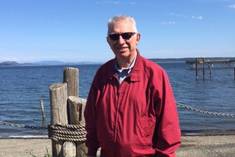Through his work on “The New Ocean Ethic” project — looking at the health of ocean and creating harmonious and sustainable relationships with the ocean — Slade was invited to attend as one of 22 global and regional “Thinkers” representing all aspects of community life. They gathered for two and a half days of “intense, intentional and focused conversation on the greatest threat facing humankind, Global Warming.”
“We are not doing enough to prepare,” Slade said. “It’s a difficult subject, and some people haven’t accepted that global warming is a threat. . . people need to start thinking that this is real.”
With the belief that local action is the best path in creating a roadmap for a change model for the world, the retreat’s mission was to move conversation to “doing” by developing community-based action plans, with drawdown potential, that hold the capacity to face and manage life in a very different world where impacts such as wildfires, floods and extreme weather events are becoming the norm with devastating, even life-threatening, results.
Gordon referenced the devastation areas of this province experienced during Hurricane Igor in 2010 and most recently the impact hurricanes had on islands in the Caribbean.
When Slade asked if Newfoundland and Labrador could ever expect to see a Category Type 5 hurricane, the answer was yes.
The impacts of global warming on small, rural and coastal communities and the challenges being faced around population size and location were examined.
Retreat participants narrowed in on specific areas where communities can take action now, such as education and awareness, municipal governance and local finance.
Slade is planning to bring a climate change expert to Fogo Island to meet with the council there and discuss how to address issues such as flooding and soil erosion caused by global warming.
“We are being impacted by climate change,” he said, referencing the increased ice flow Fogo Island experienced this year. Slade said as more ice melts in the Arctic, it is making for heavier ice conditions in and around Fogo Island.
Slade says even in rural areas, we call all do something to prepare for the impacts of climate change, and take measures to lessen our carbon footprints. He noted being in St. John’s and seeing at least 1,000 vehicles each in the parking lots for the Health Science Centre and Memorial University.
“There’s better ways to do that,” he said.
When it comes to coastal areas of the province, Slade said the time is now to look at reinforcing and building stronger wharves, breakwaters and homes by looking at the building codes related to these structures.
There’s also a lot people can do (see related sidebar) to help cut down on CO2 emissions.
“One person taking one action,” he said. “If we all did one thing we could change the world.”
With a view of echoing the First Nations and their view of being in balance and harmony with the natural world, through the next months, retreat outcomes will be harvested into a detailed, themed roadmap, with associated action items for small and rural communities. According to retreat information, the intention is to share this dynamic living document as a reference for others to begin action. Also planned is a documentary of the retreat process.
About Project Drawdown
According to information from the Pugwash Conference on Climate Change, Project Drawdown is a large international solutions-based effort moving to that point in time when greenhouse gases peak and begin to decline on a year-to-year basis.
“Drawdown The Most Comprehensive Plan Ever Proposed to Reverse Global Warming” is a New York Times Bestseller and was referenced as an important resource for discussion at the recent Pugwash Conference on Climate Change.
It is the most important goal for humanity to undertake. It is not a daydream because Drawdown is based on research that maps, measures, and models solutions that are already in place.
Pugwash Conference participant Gordon Slade provided a copy of the New York Times Bestseller ““Drawdown The Most Comprehensive Plan Ever Proposed to Reverse Global Warming” as part of research material for the related article.
Contained in it is a breakdown of pretty much every facet of modern life; the amount of reduced CO2
gigatons through improved initiatives by 2050; the net cost and the net savings.
Just some of the topics covered are:
• Solar farms
• Green roofs
• Bike infrastructure
• Walkable cities
• Educating girls
• Managed grazing
• Food composting
• Peatlands
• Forest protection
• Smart thermostats
• LED lighting
• Water saving — home
Slade notes that a lot of what is contained in this publication addresses or introduces ideas that people and communities can incorporate into their daily lives to contribute to reducing their carbon footprint.
To learn move visit: www.drawdown.org
[email protected]

 RSS Feed
RSS Feed